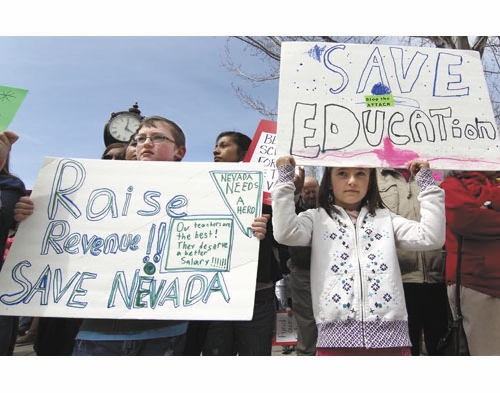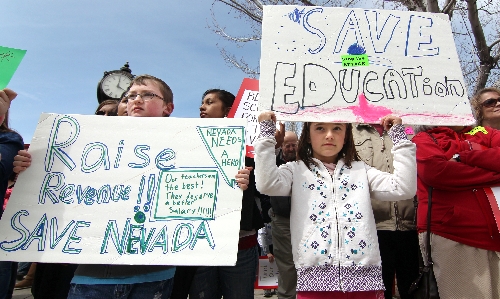Education fight moves to statehouse



CARSON CITY — Nevada’s fight to improve its beleaguered education system in the midst of a statewide recession moved from the schoolhouse to the statehouse on Monday, with the policies of Republican Gov. Brian Sandoval in the middle of the action.
On the steps of the legislative building, teachers and parents protested Sandoval’s plan to hold general fund spending to $5.8 billion for 2011-13, cutting hundreds of millions in state support for K-12 education.
Inside, Democratic lawmakers held hearings on Sandoval’s education policies and on their own reform ideas.
Democratic leaders also announced changes to the way the Legislature will conduct budget talks that will highlight votes on the most controversial spending cuts, a move in part designed to turn up the pressure on lawmakers to bust Sandoval’s $5.8 billion barrier.
How the flurry of activity more than halfway through the 120-day Legislative session will affect the outcome remains to be seen, however, as Sandoval and the Republicans appear determined to stick together to block any Democratic moves to raise taxes, which require a two-thirds majority vote.
"They are talking about policies and numbers," Natha Anderson, a Reno-area high school English teacher told the protest of about 200 teachers and parents outside the Legislature. "When we hear it, we think of our kids."
The protest, organized with the support of the Nevada State Education Association, focused on convincing Sandoval and the Republican voting bloc to reconsider their opposition to increasing taxes.
Anderson compared the fight to fending off sharks, ticking off a list of bills and proposals that would erode the power of the teachers union, reduce pay for educators and cut into retirement and health benefits.
"This is the biggest bite the sharks are coming after," Anderson said.
While protesters outside turned up the heat on Sandoval and Republican lawmakers, Democratic leaders inside tried to do the same thing with changes in the way the Legislature hears budget testimony.
Their plan is to move the debate over the most controversial budget items from committees to the floor of the Senate and the Assembly. Budgets for K-12 and the higher education system, mental health and juvenile justice programs will be discussed by the full bodies on the floor. They will then vote — putting each legislator’s position on the record.
They say the move will draw more attention to cuts proposed in Sandoval’s budget.
"This is about having a more open, transparent and really a frank discussion," said Senate Majority Leader Steven Horsford, D-Las Vegas.
Democratic leaders likened the new process to a recent move by Horsford to hear a report on Sandoval’s budget in front of the entire Senate. That hearing involved criticism by Republicans who complained Horsford wouldn’t allow Sandoval administration officials to testify.
Senate Minority Leader Mike McGinniss, R-Fallon, bristled at the notion the Senate could repeat the experience.
"I felt that was kind of a dog-and-pony show," McGinniss said.
Democrats, who control both houses, are holding sway over debates on education policy bills offered by Sandoval and Democratic members.
On Monday that meant hearings and votes on several education reform bills with bipartisan support.
Assembly lawmakers voted 34-8 and 33-9 in favor of Assembly Bills 225 and 229, both proposed by Democratic leaders.
AB225 would allow teachers who receive consecutive unsatisfactory evaluations to be returned to probationary status.
AB229 extends from one to three the number of years new teachers remain on probationary status. It also would establish a system of performance bonuses and change how teachers and administrators are evaluated. Instead of satisfactory or unsatisfactory, they would be graded on a four-part scale from highly effective to ineffective.
In committee, lawmakers heard testimony on several education bills, including at least three proposed by Sandoval:
■ AB554 would establish a letter-grade system for schools and school districts and allow parents the choice of where to send their kids to public school.
■ AB557 would set aside $20 million for teacher incentive pay.
■ AB548 seeks to streamline the education bureaucracy by replacing the elected State Board of Education with a body appointed by the governor and legislative leaders. It would empower the governor to appoint the state superintendent.
Democrats are hopeful that Republican interest in education policy reform could spark Republican interest in raising taxes, even though Sandoval has said he won’t trade policy reform for new taxes. In order to override the governor, Democrats would need to remain unified and sway two Republicans in the Assembly and three in the Senate.
So far Republican lawmakers say they’re happy to talk about reform but are still sticking with Sandoval on funding.
"If there is any impression that they are going to get votes out of Republicans to increase funding to our existing system it is misguided," said Sen. Ben Kieckhefer, R-Reno.
Sen. Joe Hardy, R-Boulder City, said he thinks Sandoval’s $5.8 billion budget is sufficient. But he added the two-year revenue projections lawmakers use to build the budget don’t arrive until May 2. That’s when they’ll know for sure the money will be there to support even Sandoval’s pared-back budget.
The Senate Finance Committee heard SB2, a measure repeatedly pushed by Sen. Michael Schneider, D-Las Vegas, that calls for Nevada to fund education at the national, per-pupil average. Nevada’s per-pupil spending, including state and local money, is $1,965 below the national average, and SB2 would require taking $1.6 billion from the state general fund for schools.
Another bill, SB372 sponsored by Horsford, seeks to wrestle increased room taxes in Washoe and Clark counties from Sandoval’s budget to augment education. The money from the voter-approved measure was to be used to help plug a state general fund shortfall before reverting to education in 2011.
But Sandoval’s proposal continues putting the money, estimated at $221 million, in the general fund until 2014.
The Associated Press contributed to this report. Contact reporter Benjamin Spillman at bspillman@reviewjournal.com or 702-477-3861.












